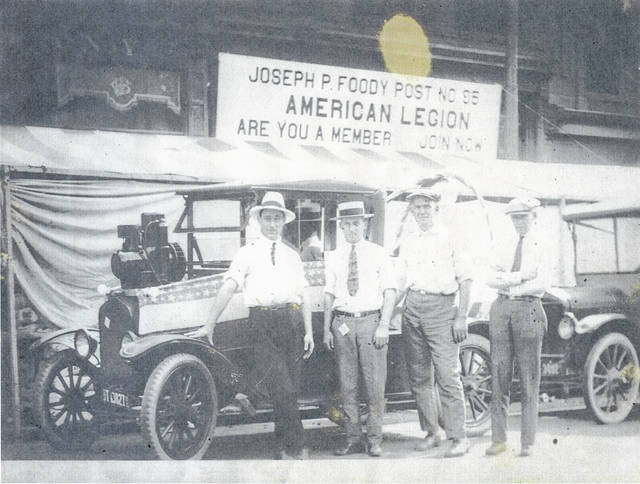
Following World War I — the war to end all wars — those who had fought side-by-side during the conflict desired to continue the comradeship after peace had been declared. In March 1919 a group of former soldiers assembled in Paris in order to form a new organization. Two months later, a large gathering of veterans took place in St. Louis and the American Legion was officially established.
Just a few months later, veterans in Xenia met to establish a Post. On Sept. 25, 1919, officers were selected. Those chosen were: Charles Darlington, post commander; Paul B. Turnbull, vice commander; Ohmer Tate, adjutant; Fred Schultz, finance; and Paul B. Cresswell, secretary. The post was named for Joseph P. Foody, the only Xenian killed in World War I.
Following his graduation from St. Brigid high school, Foody enlisted in the US Army, said his goodbyes to the family and boarded the train for Camp Taylor, Ky. Upon completion of his training, he was sent to Camp Beauregard, La., and then set sail for France Aug. 5, 1918, arriving for duty in France Sept. 15. Only a few days after his arrival, he was making a charge and going “over the top” with his outfit when he was killed by machine gun fire. The date was Oct. 5. He is buried in the American Cemetery in France.
The idea of the American Legion Post was well-received in Xenia and when the charter was issued there were 170 charter members.
The newly organized post had three goals: To get the men back to work after serving in the military; to see that the disabled veterans received proper care; and to do what they could to take care of the widows and children of dead and disabled veterans.
Committees were formed and the members quickly stepped up to the tasks.
The meetings of the newly organized group were held in various downtown buildings for a few years and then in the basement meeting room of the court house.
The post took on a variety of civic responsibilities in addition to helping veterans. A new flag pole was erected and dedicated on the court house lawn. A junior baseball club was organized in 1920 and the post sponsored two Boy Scout troops, one in Xenia and the other at the OSSO Home.
For the enjoyment especially of the younger set, a pet parade was sponsored in 1932. That same year the members attempted to help those who had been affected by the Great Depression by opening a soup kitchen.
The organization was nearly 20 years old when a new “Sons of the American Legion” organization was officially formed.
The legion donated a glass storage case for display of war mementos which was placed on the second floor of the Court House and quickly filled.
May 26, 1945 was an exciting day for the post. On this date, they took possession of the house known as “The Kingdom.” This was the mansion which had formerly been the home of Joseph Warren King, a wealthy resident. His family presented the structure to the legion for their new post home. This was a large structure, which during the winter of 1951, used 20 tons of coal heat the building.
This building was in use by post 95 until the membership voted to sell the house to the Sohio Oil Company. The intention was to raze the building and construct a service station in its place. The building was sold for $70,000.
Another building was acquired on Home Avenue, which served as the post home for several years.
In order to raise funds for veterans, Poppy Day became a popular event. This was a national event with the poppies hand made by veterans who were patients in various veterans’ hospitals. This was a benefit to the patients, giving them a useful task which required minimal skills. Proceeds from the sales were often used to purchase items for the patients and to support those veterans or widows of veterans who were in need.
World War II was over at last. Veterans were returning home and once again the legion was instrumental in helping the men and women get back to what had been a normal life.
Many of the soldiers who had enlisted and entered the war effort did not return. One of those was Capt. Franklin Lee Cornwell, who was the first local legionnaire’s son to die in action in World War II.
In May 1946, the post chose to change the name to honor Capt. Franklin Lee Cornwell. From that time, the post was known as Foody-Cornwell American Legion Post 95.
Franklin D. Cornwell graduated from Xenia Central High School in 1938. As a member of the National Guard, he was called to duty in 1940. He attended officers candidate school and later held the rank of captain. He was cited for attempting to save a soldier’s life when a raft carrying nine enlisted men overturned. A short time later, on June 19, 1944, he was the victim of a direct shell hit while fighting on the beach of St. Lo, France.
He was buried there, but later his body was returned to Xenia. Military services were held at the Kingdom and he was interred at Woodland Cemetery. He was posthumously awarded the Bronze Star for bravery during a battle June 12, 1944.
When the auxiliary was formed in 1946, the ladies helped with many of the projects including Memorial Day services and patriotic services. Students at the OSSO Home received special attention
The post home on Home Avenue has been sold and today the Foody-Cornwell American Legion Post shares a building on West Second Street with the VFW Post. The legion continues to provide assistance and comradeship to veterans of all wars.


